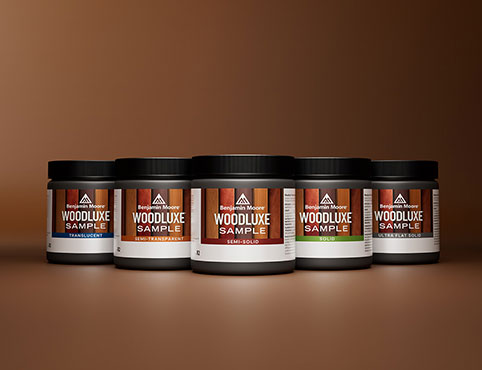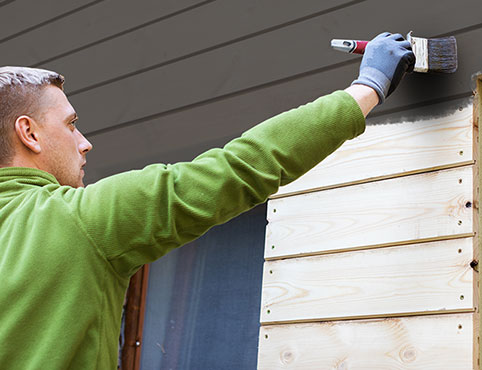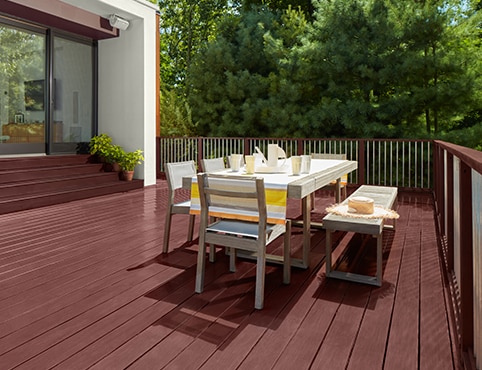How to Choose a Wood Stain
A fresh coat of stain protects and beautifies exterior wood surfaces. Choose Woodluxe® Exterior Stains for decks, fences, swing sets, outdoor furniture, and any other exterior wood project for the best outcome.
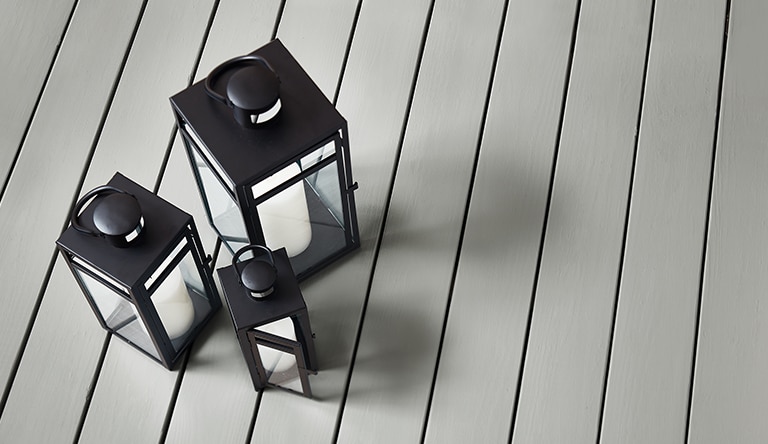
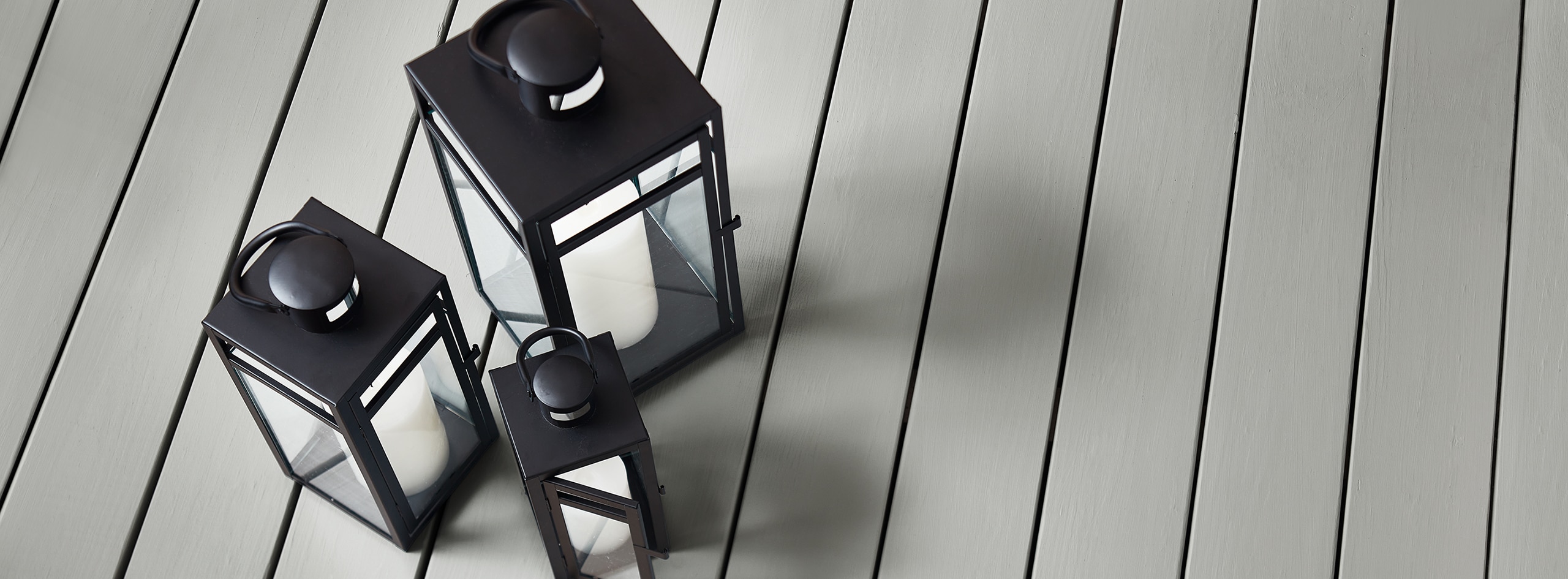
Opacity and color: This combination makes up the final look of your staining project. Follow this step-by-step guide for how to choose a wood stain color and get an outcome you’ll love. For more help in choosing a wood stain, browse the full list of Woodluxe colors and opacities.
Tips for Choosing a Wood Stain
Step 1: Consider the Age and Condition of Your Wood
The age and condition of the wood plays an important role when you are choosing a wood stain.
Evaluating the approximate age and wear-and-tear level of your deck, fence, or other exterior wood project is an important first step. Need help? The experts at your locally owned store can help you determine the best exterior stain products for your outdoor spaces.
Step 2: Determine Your Wood Staining Goals
Want to know how to choose a wood stain? Answer these three questions:
- Do you want your stain to enhance the natural appearance of your wood or transform the wood’s existing color?
- Do you want to make a color statement or stay as close as possible to your wood’s natural hue?
- How much of the wood’s natural grain do you want to show through?
Step 3: Take Surroundings into Account
When choosing a wood stain color, here are a few things to keep in mind:
- Consider your home’s exterior siding color.
Blend in? If you want your deck to blend in with your existing exterior color scheme, choose a stain that is the same color as your home’s siding or trim but a shade lighter or darker.
Stand out? If you want your deck to stand out, consider using a complementary color for an energizing look. Complementary colors are opposite each other on the color wheel. Learn more about complementary colors in the Color Handbook video.
Testing a sample of the stain color and opacity before you buy the full amount needed for your project will get you on the right track to selecting the wood stain that’s right for you.
- Assess your home’s landscaping.
Softer colors highlight colorful landscaping and draw less attention to decks, railings, and fences. A stain in a neutral color, like Maritime White OC-5 or Beige Gray ES-51, keeps the visual focus on colorful flora and fauna, and less on your deck and railings. A red-toned stain, like Boston Brick 2092-30 or Beaujolais 1259, will bring out the greenery. The same rules apply for fence colors.
- Think about your home’s climate and natural light.
Many homeowners living in warmer states prefer a lighter deck color, as it absorbs less heat in direct sunlight. Lighter colors like Maritime White OC-5 and Beige Gray ES-51, mentioned above, are great for creating a light, airy look, as are White OC-151 and Cliffside Gray HC-180.
Step 4: Choose Your Wood Stain Opacity
Stains come in various opacity levels.
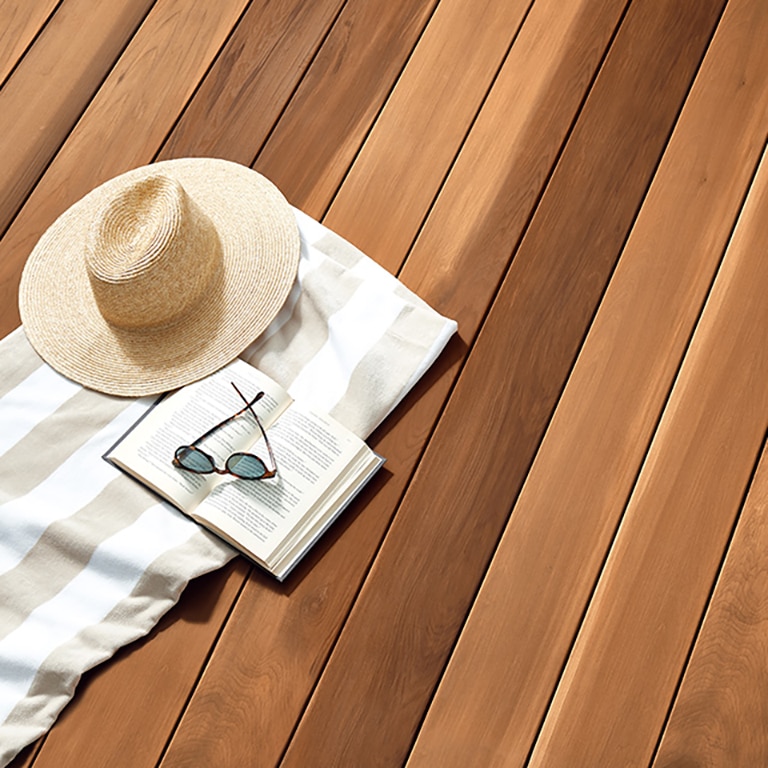
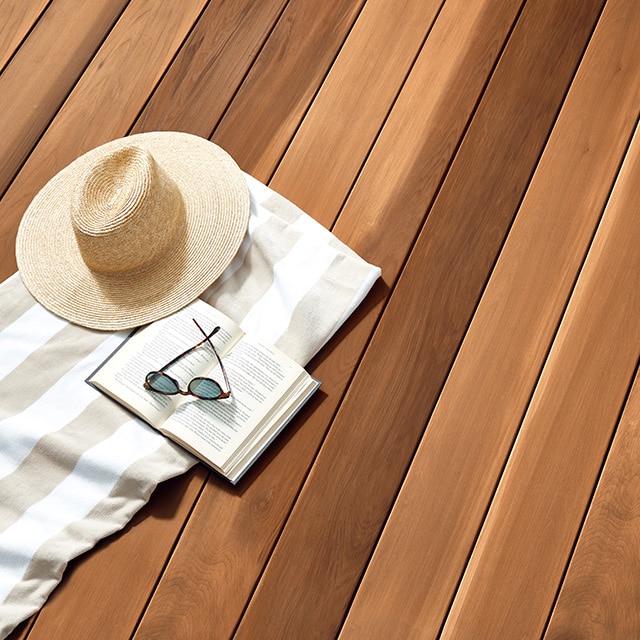
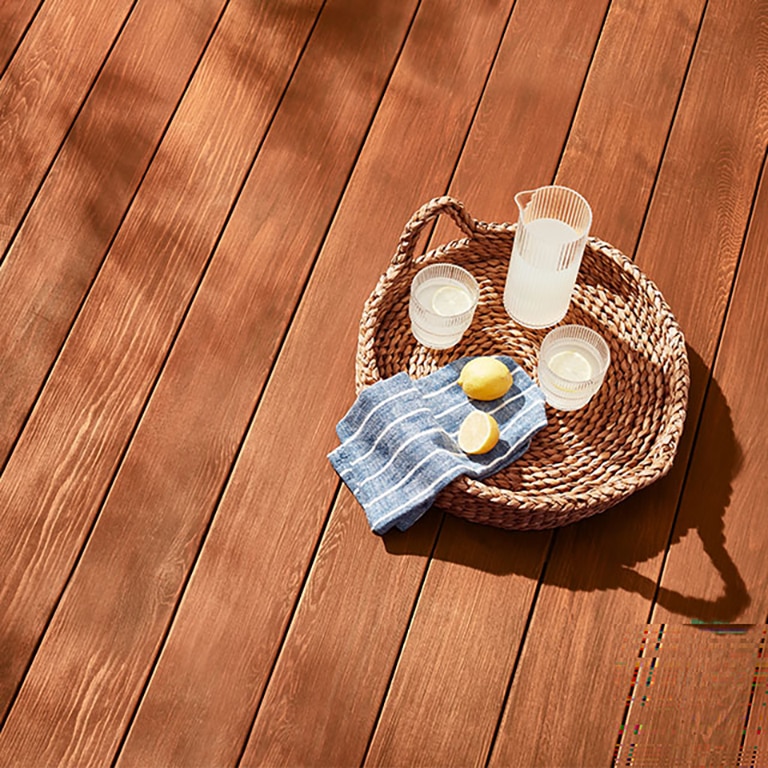
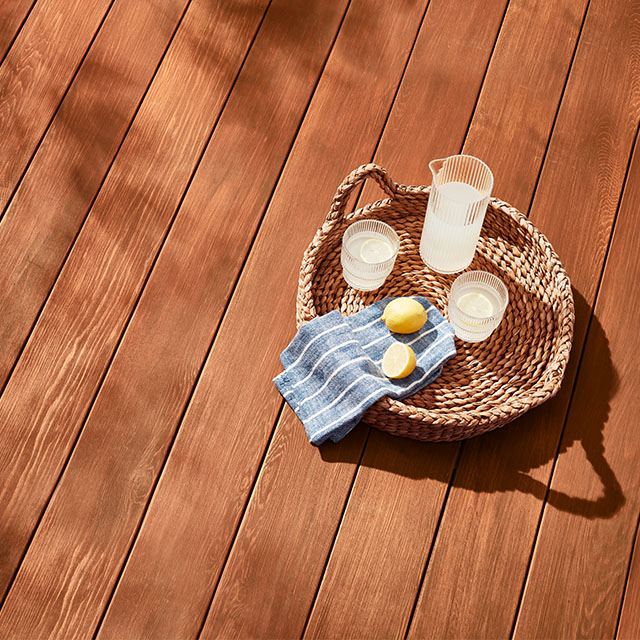
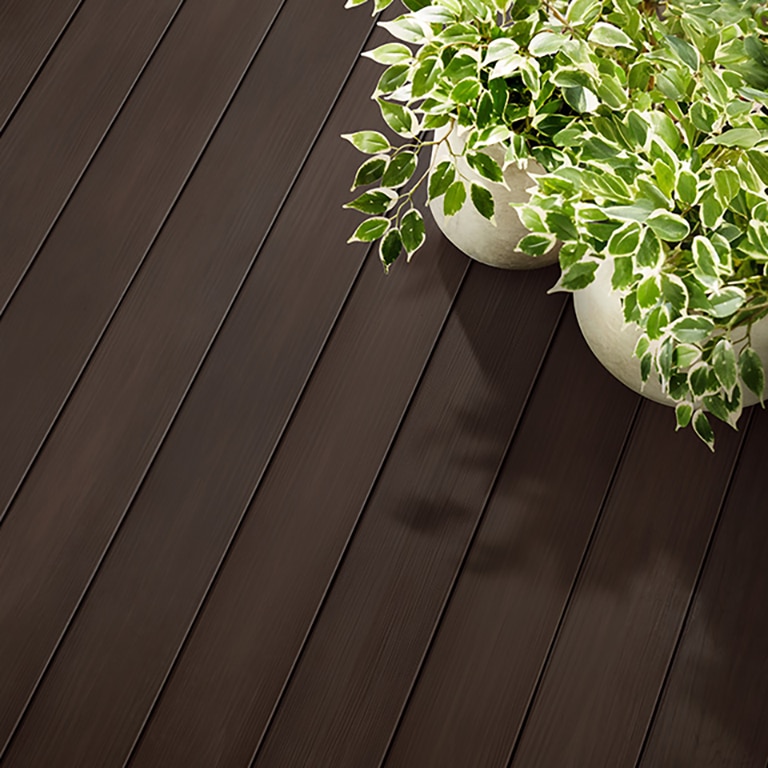
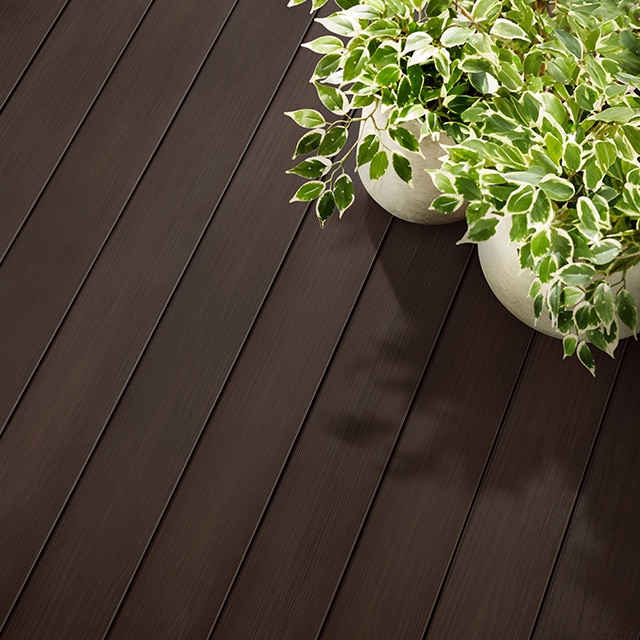
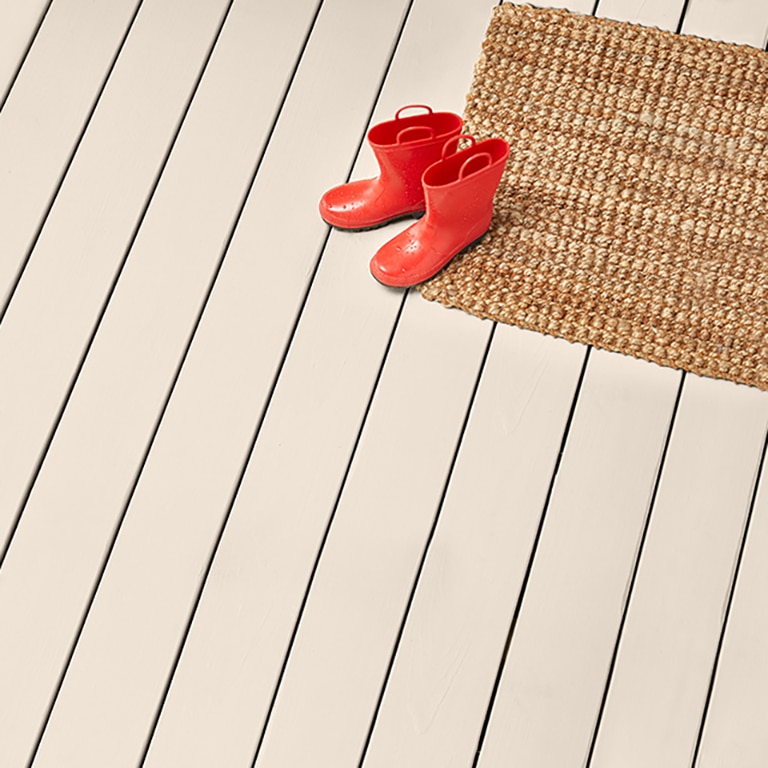
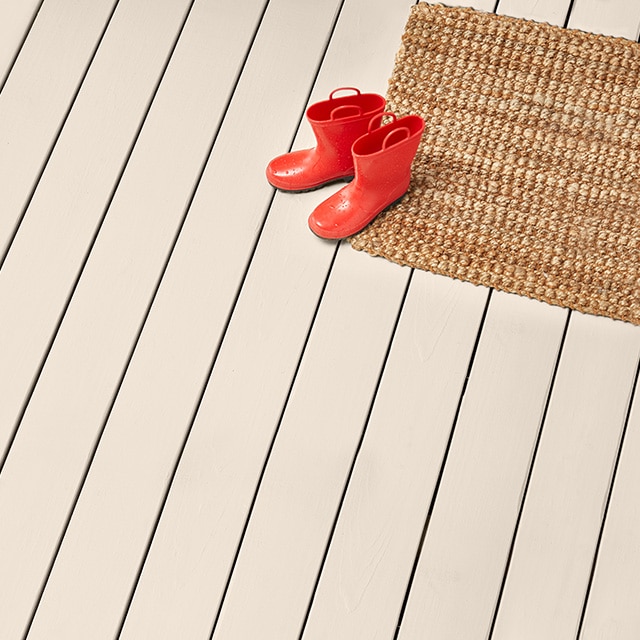
Translucent
- What is Translucent opacity? Translucent stain allows the full beauty of the wood to show through. Woodluxe Translucent Stain is available in seven ready-mix colors.
- What it does: Highlights the wood’s natural appearance.
Semi-Transparent
- What is Semi-Transparent opacity? Semi-transparent stain allows most of the grain pattern and texture of the wood to show through. Woodluxe Semi-Transparent Stain is available in 75 colors.
- What it does: Enhances the beauty of the wood with color, while still allowing most of the wood’s natural grain and texture to show through.
Semi-Solid
- What is Semi-Solid opacity? Semi-solid stain allows the texture and some of the grain pattern of the wood to show through. Woodluxe Semi-Solid Stain is available in 75 colors.
- What it does: Covers most imperfections, while allowing some of the wood’s natural grain and texture to show through.
Solid
- What is Solid opacity? Solid stain allows the texture of the wood to show through. Woodluxe Solid Stain is available in all 3,500+ Benjamin Moore colors.
- What it does: Covers the majority of imperfections, while allowing a bit of the wood texture to show through.
Download the Woodluxe brochure for more information or pick one up at your locally owned Benjamin Moore store.
Helpful Tip
Solid opacity stains provide longer-lasting results and help cover imperfections.Step 5: Explore the Best Wood Stain Color Options
A stain color can either enhance or transform the natural hue of wood. If you want your stain to enhance the natural appearance of your wood, choose a color that’s close to its natural hue.
Most homeowners opt for Translucent to allow the wood’s grain and texture to show through. Translucent Woodluxe Exterior Stain offer just a hint of color, each aligning with a specific wood type:







Step 6: Synching Color Choices with Wood Undertones
All wood has a natural undertone. Here are some ideas for choosing wood stain colors based on undertones and wood types. Note that all stain color suggestions below are shown in Semi-Transparent opacity. Explore Woodluxe stains and opacities on our color detail page.
Wood With Yellow Undertones
• Most common wood types: Cedar, pine
• To enhance, try these:
To go warmer, try these:
To go cooler, try these:
Wood With Orange Undertones
• Most common wood types: beech, cherry
• To enhance, try these:
To go warmer, try these:
To go cooler, try these:
Wood With Red Undertones
• Most common wood types: Redwood, mahogany
• To enhance, try these:
To go warmer, try these:
To go cooler, try these:
Wood With Warm Brown Undertones
• Most common wood types: Red oak, walnut
• To enhance, try these:
To go warmer, try these:
To go cooler, try these:
More Wood Stain Color Tips
|
1
Match the color of your deck to your indoor flooring to make it a natural extension of your home. |
2
Consider staining the handrails, banisters, or steps a different color. Using a contrasting wood stain color on these elements can add architectural interest and dimension. |
3
Darker wood stain colors are great for hiding dirt. Rich chocolate browns, such as Fresh Brew 1232 or Oxford Brown ES-67, not only add elegance and depth but are ideal for high-traffic areas. |
Step 7: How to Sample Wood Stain
It is essential to test your wood stain color before you commit.
- Let the sample dry completely before making your decision on color and opacity, as the stain’s appearance can change as it dries.
- Especially with lower opacities, keep in mind that the color will have variations. Just as natural wood has different textures and grains, your stained wood will likely have lighter and darker spots.
You can buy Woodluxe Exterior Stain samples online and have them shipped directly to your home or pick them up from your locally owned Benjamin Moore store.
Helpful Tip
Test wood stain color and opacity on a few different pieces of wood: Not all pieces will take the stain the same way.Step 8: Start your wood staining project
You’ve picked a wood stain opacity and color, and you’ve tested a sample on different pieces of wood—and most importantly, you’re happy with the results. Now it’s time to start your wood staining project.
Preparation is key: Check out how to prep a deck for staining, then see our guide on how to stain a deck. As always, the experts at your locally owned Benjamin Moore store can help with any questions you have, from choosing a stain color to using the product.
Frequently Asked Questions
Q. How do I choose the best wood stain?
A. The age and condition of the wood plays an important role when you are choosing the best wood stain for your project, as the opacity and color you select will make all the difference.
Once you’ve decided on an oil- or water-based stain, we suggest using premium Woodluxe® Exterior Stain for the ultimate in outdoor beauty. Years of technological innovation and research have yielded this brand-new exterior stain that seals and protects wood, with luxurious results.
Q. How do I find the right wood stain color?
A. A stain color can either enhance or transform the natural hue of wood. If you want your stain to enhance the natural appearance of your wood, choose a stain color that’s close to the wood’s natural hue. If you want to cover imperfections or make a bold statement, consider Woodluxe® Solid Exterior Stain in any of Benjamin Moore’s 3,500+ colors.
Wood stains come in many colors and several opacities, from translucent to solid. Once you’ve decided whether you want to enhance or transform the look of your wood, you can explore the many colors and opacities Woodluxe offers. Be sure to sample your choices to see how they look in real life.
Q. What are the best wood stain colors?
A. The best wood stain color for your deck or other outdoor projects is the one you love the most. Some popular picks our customers love include Teak ES-30, Cordovan Brown ES-62, and Amherst Gray HC-167.
For help in selecting a wood stain color, contact the experts at your locally owned store and talk through your project to discover which options are right for you.
Q. Which wood stain lasts the longest?
A. For wood stain that lasts, we suggest Benjamin Moore Woodluxe®, an innovative line of oil- and water-based exterior stains that seal and protect wood, with luxurious results.
Woodluxe’s formulas deliver excellent durability and protection, while also offering a range of gorgeous opacities and colors. From UV exposure to frost, Woodluxe protects wood under a variety of weather conditions, all year long.
Q. How do you match wood stain color to existing wood?
A. To match stain color to existing wood, it is essential to sample the stain on the wood before you commit. Let the stain dry completely before making your decision on color and opacity, as the stain’s appearance can change as it dries.
Especially with lower opacities, keep in mind that the color will have variations. Just as natural wood has different textures and grains, your stained wood will likely have lighter and darker spots. For more help on matching wood stain color, contact the experts at your locally owned store.
































